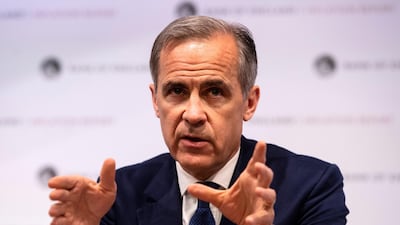Mark Carney, the Canadian hailed as a rock-star central banker when he became governor of the Bank of England in 2013, has only a year to go before he leaves office.
Already the race to succeed him is under way. But is this a job that any one person should have?
Mr Carney, who was busy fielding questions from the press last week about the BoE’s decision to keep interest rates on hold at 0.5 per cent, is the central figure in determining British monetary policy. He chairs the committee that sets rates and decides on unconventional measures such as quantitative easing. He also chairs the Financial Policy Committee (FPC) set up in response to the crisis of 2008 to consider and respond to systemic threats to financial stability. A third weighty task is chairing the Prudential Regulation Committee, which determines the supervision of not just individual banks but also insurers.
That’s too much power to confer on one person, however gifted, and one institution, however gilded.
There is a strong case for revisiting the reforms that have concentrated excessive authority at the BoE over and above its core responsibility in monetary policy. More immediately, there is also a strong case to shorten the length of time that any one individual can head so powerful an institution.
One of the reforms strengthening the BoE since the 2008 financial crisis is welcome. Its new capacity to tackle looming risks to financial stability makes sense. Central banks have in fact long been involved in this task. Already in the 19th century the Bank was intervening in order to quell banking panics. The “macroprudential” toolkit available to the FPC provides an alternative to the blunt instrument of raising interest rates to arrest dangerously strong credit growth. The committee can, for example, instead require banks to hold more capital against their lending or restrict loans to individuals who are borrowing high amounts in relation to their income.
The BoE’s role in supervising individual banks and insurers through the Prudential Regulation Authority is more questionable. When Labour chancellor Gordon Brown made the Bank independent in setting interest rates in 1997 he stripped away its banking supervisory job, which moved to a new body, the Financial Services Authority (FSA). Conservative chancellor George Osborne undid this in a 2012 law, handing supervision back to the central bank, arguing that the divorce had contributed to the financial crisis.
Neither the Bank nor the FSA handled the banking crisis well, but Osborne’s rationale for his reform was unconvincing. There was a similar split of functions in Canada, yet it did not succumb to the crisis. By contrast, supervision by the central bank did not spare other countries, notably the United States, where the Fed – though not the only regulator – plays a crucial part through overseeing bank holding companies. The root of the problem was that supervision was generally too lax, whoever was formally in charge. As Adair Turner, the last head of the FSA before it was disbanded in 2013, argued soon after the financial crisis, the fundamental flaw was unwarranted “intellectual assumptions about the self-correcting nature of financial markets”.
_______________
Read more:
Bank of England governor urges regulation to end cryptocurrency "anarchy"
Is it time to stop paying bank workers bonuses?
_______________
A reversal of Mr Osborne’s supervisory reform is necessary eventually in order to tackle the undesirable accumulation of power at the BoE. But now is not the right time to take such a step. Institutional disruption exacts its own cost. Banks would hardly welcome yet another reshuffling of regulatory functions so soon after the last one.
That makes it all the more pressing to curtail the time that any one individual can head this extraordinarily influential institution. Mr Carney’s successor will be able to serve for eight years – the same as the president of the European Central Bank. This is too long, the more so since other checks and balances such as the appointment of external members to the three key committees are a feeble curb on the sway of the Bank insiders led by the governor.
A simple and manageable reform would be to limit the tenure of governors to a single term of six years, which happens to be the same as Mr Carney’s when he leaves next year. There should be no return to the former system allowing a governor to be reappointed for a second five-year term, which meant that Mervyn King was governor for 10 years between 2003 and 2013.
Whoever takes over from Mr Carney next year would do well to stick to the beat and avoid the temptation to sound off about subjects that do not lie strictly within the central bank’s remit. The governor has had good reasons to talk about climate change, since it creates risks for banks as well as insurers. But venturing too far beyond the conventional territory of central banking can give the impression of overreach.
The concentration of power at the BoE is not necessarily in its interest or that of its governor. The crucial role remains that of monetary policy, which itself has become more controversial as quantitative easing has raised asset prices and helped the government finances by lowering bond yields. When Mr Brown set the Bank free to set interest rates in 1997, the then-governor Eddie George was incensed at the chancellor’s failure to square with him that the quid pro quo was loss of bank supervision. But Mr George accepted it was a price worth paying. That remains the case.
The greatest danger facing an overmighty BoE is that there is an eventual backlash that puts in jeopardy its cherished independence in monetary policy. A celebrity leader is not what the Bank now needs.
Indeed, a degree of humility on the part of his successor may be his or her most vital quality.
Reuters

